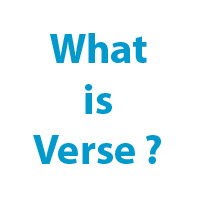What is Verse?
A verse is a metrical line referring either to poetry or to an individual poem. In a narrow sense of the word, a verse is an individual line of poetry. Sometimes it also means a stanza of a poem or the poetry in general. But verse is different from poetry in that sense it lacks the profundity of feeling and expression. Use of verse is to refer to a stanza of a poem or song.

Some critics make a distinction between poetry and verse, noting that all poetry is verse, but that not all verse is poetry. In poetry while talking about verse we find different kinds of verse as “blank verse”, which consists of lines of iambic pentameter which are unrhymed. Sometimes we find words like “light verse”, also known as open form verse. Light verse is composed in a form of poetry but it differs from other forms of verse by the fact that its rhythmic pattern is not organized into meter. Most free verse also has irregular line length and lacks rhyme.
Most of those critics who make the distinction between verse and poetry argue that verse is a lower form of expression than poetry. They suggest that verse is notable mainly for its rhythmic and metrical form, whereas poetry is characterized by imagination, a less obvious structure, and a lofty purpose. Therefore, the distinction implies a certain hierarchy in which poetry is valued more highly than “mere” verse.
Published on 24 Jan. 2014 by Kedar Nath Sharma
